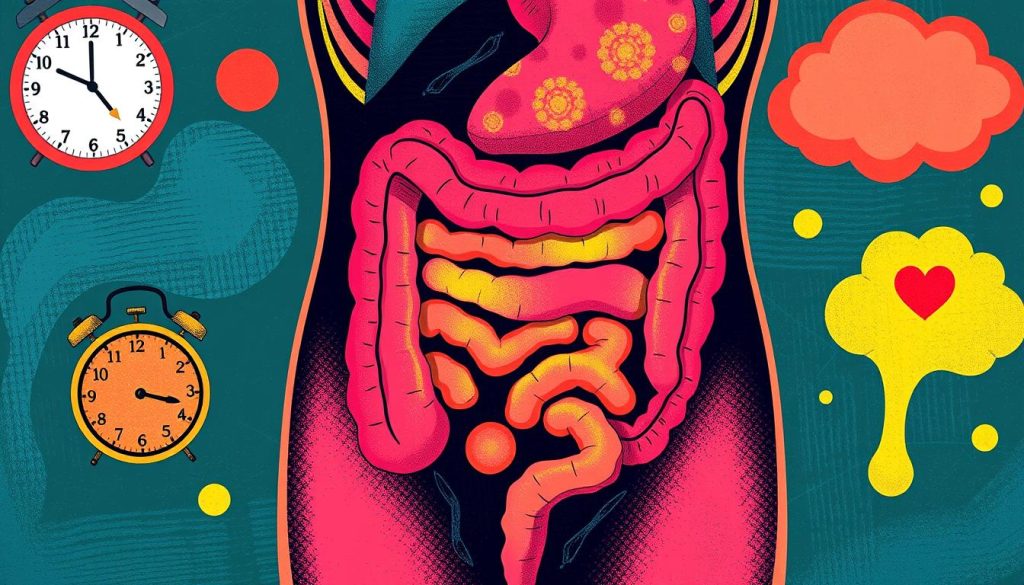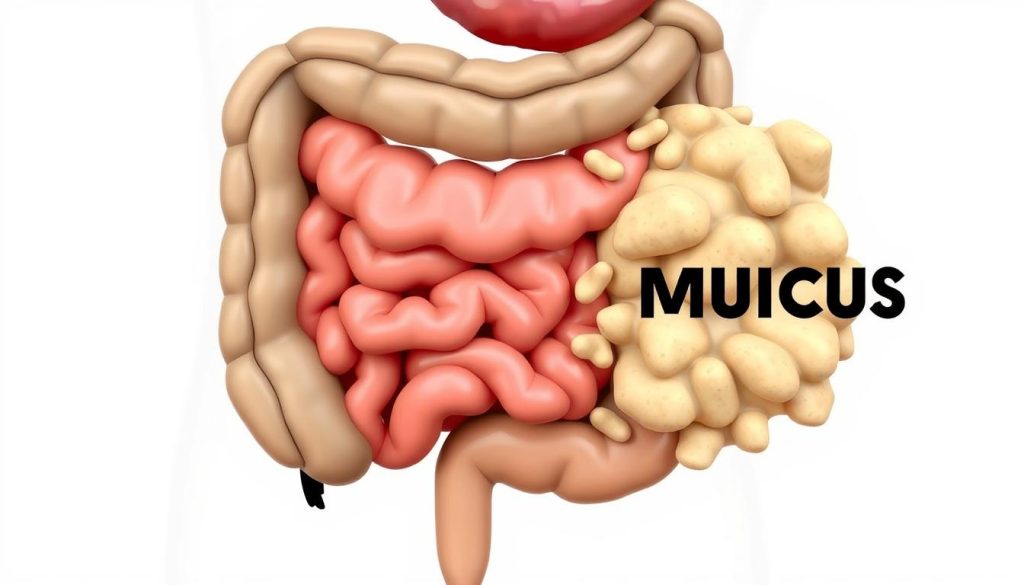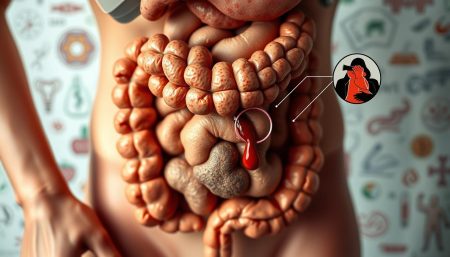Constipation and mucus in stool can be really uncomfortable. These symptoms might affect your daily life and show there’s something wrong with your health. It’s key to focus on constipation relief and the right treatment for mucus in stool to keep your digestive system healthy.
Understanding how to handle constipation and mucus is important. It means knowing your body’s signals well. By exploring the reasons behind these symptoms and finding ways to ease them, you can improve your digestive health. This guide will help you understand and manage these issues better.
Understanding Constipation and Its Common Symptoms
Constipation is a common health problem. It happens when you don’t have bowel movements often or when it’s hard to pass stool. Knowing the symptoms early can help find constipation relief and fix digestive issues with mucus. This part explains how bowel movements work and what signs show you might have constipation.
The Basics of Bowel Movements and Constipation
Everyone’s bowel movements are different. If yours are less frequent and hard to pass, you might have constipation. This can cause discomfort and might need changes in your lifestyle or treatment.
Recognizing the Signs of Constipation
It’s important to know the constipation symptoms to act fast. Common signs include:
- Difficulty in passing stool
- Less than three bowel movements per week
- Bloating and abdominal pain
- A feeling that not all stool has passed
Constipation can also be a sign of digestive issues with mucus. This shows why it’s key to understand these signs for better digestive health.
| Sign | Common Relief Measures |
|---|---|
| Difficulty in passing stool | Increased water intake, fiber supplements |
| Infrequent bowel movements | Regular exercise, probiotics |
| Bloating and discomfort | Reduced intake of high-gas foods, gentle stomach massages |
| Incomplete evacuation | Stool softeners, timely bathroom breaks |

The table shows simple ways to get constipation relief and manage digestive issues. Spotting symptoms early and treating them right is vital to avoid more problems with constipation and mucus in the digestive system.
Demystifying Mucus in Stool: Normal vs. Excessive
Understanding mucus in stool is key to good digestive health. A bit of mucus is normal, helping the intestines move smoothly and protecting them. But too much or a change in color can mean health problems, like mucus in stool causes.
Mucus is a slippery substance made by the digestive tract’s lining. It helps stool move easily. But too much mucus can mean inflammation or infection, which are mucus in stool symptoms.

Knowing when mucus is a problem involves looking for other signs. These include stomach pain, changes in stool, and feeling unwell. These signs, along with changes in mucus, can point to serious mucus in stool causes, like infections or chronic illnesses.
- Normal Mucus: Clear and present in small amounts.
- Excessive Mucus: Larger amounts, yellow or white color, possibly accompanied by blood or odor.
It’s important to watch for changes and see a doctor if they don’t go away. Knowing mucus in stool symptoms can help catch serious problems early.
While mucus is usually normal, changes might mean you need to check your digestion and health. There are mucus in stool remedies like diet changes or medical treatments, depending on your symptoms and health.
Knowing when to treat yourself and when to see a doctor is important. Good digestive health also means listening to your body, including watching the mucus in your stool.
The Interconnection Between Constipation and Mucus in Stool
The link between constipation with mucus and rectal health is complex. It often causes discomfort and worry. This part explains how these two issues are connected. It shows how constipation can make mucus more visible or increase its production.
How Constipation Can Lead to Mucus Buildup
Understanding constipation and mucus in stool starts with knowing about stool transit time. Constipation makes stool stay in the colon longer. This leads to drier, harder stool because the colon absorbs more water.
The pressure from straining can irritate the colon’s lining. This irritation makes the body produce more mucus. The mucus helps make passing the stool easier.
Rectal Health and Mucus Production
Good rectal health is key to managing mucus and constipation symptoms. Mucus protects and lubricates the intestine’s lining. But constipation can upset this balance, making mucus more visible in stools.
This extra mucus is the body’s way to help pass hard, dry stools. Keeping the rectal area healthy is important. Ignoring issues can lead to problems like hemorrhoids or fissures.
| Condition | Symptoms | Impact on Rectal Health |
|---|---|---|
| Constipation | Hard, dry stools; straining; infrequent bowel movements | Increased risk of irritation and mucus production |
| Normal Bowel Movement | Soft, formed stools; regular bowel movements | Stable mucus production; maintained lining integrity |
| Excessive Mucus | Visible mucus in stool; possible discomfort | Potential indicator of underlying irritation or disease |
Exploring the Causes of Constipation with Mucus
It’s important to know what causes constipation and mucus in stool. This section will look at different factors that lead to these issues. We’ll see why they happen and how they affect our digestive health.
Constipation and mucus in stool often go hand in hand. They can be caused by what we eat or by health problems. Let’s take a closer look at some common reasons:
- Dietary Choices: Eating too little fiber can make stool hard and slow. This can irritate the bowel lining, causing mucus.
- Hydration Levels: Not drinking enough water can cause constipation. Dehydration also makes the body produce more mucus to help with hard stools.
- Health Conditions: Conditions like IBS, Crohn’s disease, or Colitis can cause mucus in stool. These diseases lead to inflammation and abnormal mucus production in the gut.
Looking into constipation causes often means checking our daily habits and health history. Here’s a comparison of lifestyle factors and health conditions that can cause constipation and mucus.
| Lifestyle Factors | Signs of Medical Conditions |
|---|---|
| Low fiber diet | Persistent abdominal pain |
| Inadequate fluid intake | Weight loss without effort |
| Insufficient physical activity | Blood in stool |
| Stressful lifestyle | Frequent diarrhea or constipation |
Knowing these signs can help us understand digestive issues with mucus. It guides us to make lifestyle changes or seek medical help if needed. Early action can greatly improve our digestive health and overall well-being.
Constipation and Mucus in Stool: Lifestyle Risk Factors
It’s important to know how our lifestyle affects our digestive health. Certain habits can make constipation worse. This includes symptoms like mucus in stool.
Dietary Habits That Can Aggravate Symptoms
What we eat greatly affects our bowel movements. Eating less fiber is a big problem. Fiber helps make stools softer and easier to pass.
On the other hand, too much dairy and processed foods can make constipation worse.
The Role of Physical Activity in Digestive Health
Being active is key to good digestive health. Exercise helps food move faster through your body. It also makes stools softer and easier to pass.
Adding moderate exercise to your day can help prevent constipation. Try brisk walking or cycling.
| Lifestyle Factor | Impact on Digestive Health |
|---|---|
| Low Fiber Intake | Increases risk of constipation, leading to harder, smaller stools |
| High Dairy and Processed Foods Consumption | Can lead to more severe constipation and increased mucus production |
| Inadequate Physical Activity | Slows down digestion, increases risk of constipation |
| Regular Moderate Exercise | Enhances gut motility and helps maintain regular bowel movements |
Illnesses and Conditions That Result in Mucus in Stool Causes
It’s important to know the medical conditions that cause mucus in stool symptoms. These can range from direct bowel issues to broader systemic diseases.
Bowel Diseases and Disorders
Mucus in stool often points to specific bowel disorders. These include irritable bowel syndrome (IBS) and Crohn’s disease. These conditions show inflammation or irritation in the intestines.
Systemic Diseases with Gastrointestinal Manifestations
Systemic diseases can affect the whole body, including the digestive system. Conditions like lupus and diabetes can cause unusual mucus production. This shows how these diseases can impact the body in many ways.
| Disease | Bowel Symptom | Common Mucus Presentation |
|---|---|---|
| Ulcerative Colitis | Chronic inflammation, ulcers | Continuous clear or white mucus |
| Cystic Fibrosis | Thick mucus in intestines | Sticky, dense mucus |
| Scleroderma | Hardening of tissues | Intermittent, may be mixed with blood |
| Lupus | General inflammation | Variable, often during flare-ups |
Is It an Infection? When Mucus Points to Microbial Culprits
At times, mucus in stool might signal an infection in stool. These infections can come from bacteria, viruses, or parasites. They deeply affect the gut. Knowing how these microbial causes of mucus work is key to getting help fast.
Looking into mucus and possible infections, it’s vital to see how microbes mess with digestion. Many pathogens cause inflammation in the gut. This is the body’s way of fighting off invaders. The inflammation leads to more mucus, showing a digestive system infection.
- Bacteria: Some, like E. coli or Salmonella, cause bad diarrhea and mucus in stool.
- Viruses: Viruses like rotavirus or norovirus mess with digestion and can make stool mucusy.
- Parasites: Parasites, like Giardia, can also cause similar symptoms.
Telling apart the different microbial causes of mucus is key for diagnosis and treatment. If you see mucus with other signs like belly pain or weird bowel movements, see a doctor. They can check for a infection in stool. Catching digestive system infections early helps avoid bigger problems and speeds up recovery.
Diagnostic Steps to Determine the Cause of Constipation and Mucus
Finding out why someone has constipation and mucus in their stool is a detailed process. It starts with a deep look into their medical history and how they feel. Sometimes, doctors need to run tests to figure out what’s going on.
Medical History and Symptom Checklist
Doctors start by asking a lot of questions about a person’s health. They want to know about their diet, lifestyle, any health issues, and what medicines they take. Keeping a diary of symptoms can help doctors see how different things affect bowel movements.
Laboratory Tests and Scans
To get a clearer picture, doctors use tests and scans. These might include blood tests, stool analysis, and imaging like X-rays or CT scans. Each test helps doctors understand the health of the digestive system better.
| Type of Test | Purpose | What It Detects |
|---|---|---|
| Blood Test | Check general health markers and organ function | Signs of infection, dehydration, or organ issues |
| Stool Analysis | Examine the presence and types of mucus, blood, and bacteria | mucus in stool, microbial infections, digestive disorders |
| Abdominal X-ray | Visual assessment of the abdominal area | Blockages, excessive stool retention (indicative of constipation) |
| CT Scan | Detailed cross-sectional images of the abdominal region | Structural abnormalities, tumors, severe constipation cases |
By doing these detailed tests, doctors can create a treatment plan that really works for each person. This way, care is focused on what each person needs to manage their constipation and mucus.
Treatment for Mucus in Stool and Constipation Relief
Constipation with mucus can be uncomfortable and a health concern. There are many treatments to help. These aim to make stool easier to pass and reduce mucus. Finding the right treatment is key to better bowel health and overall well-being.
Medications and Over-the-Counter Solutions
Many over-the-counter options and medications can help with constipation and mucus:
- Fiber supplements, which help increase stool bulk and frequency.
- Stool softeners such as docusate sodium, which make stools easier to pass.
- Osmotic agents like polyethylene glycol, which draw water into the bowel to soften stool.
- Lubricant laxatives, including mineral oil, aiding smooth stool passage.
These can greatly help with constipation relief and reduce mucus in stool.
Procedural Interventions for Severe Cases
For severe or persistent cases, more serious treatments might be needed:
- Manual removal of stool, a method occasionally required in severe instances of constipation.
- Enemas and suppositories that can provide immediate relief in acute settings.
- More advanced procedures, such as trans-anal irrigation or surgery, may be considered in cases unresponsive to other treatments.
When constipation with mucus doesn’t go away, these treatments are essential. They help not just with constipation but also with getting back to normal digestion.
Mucus in Stool Symptoms: When to Seek Medical Help
Seeing mucus in stool symptoms can be worrying. While some mucus is normal, knowing when it’s a sign of a bigger problem is key. This guide will show you the difference between normal mucus and when you should see a doctor.
Many people find mucus in their stool from time to time. This can be because of minor irritation in the digestive system. But, it’s important to watch for changes or patterns that might mean you need to see a doctor.
- Persistent presence of mucus over several days
- Increase in mucus accompanied by pain or blood
- Mucus in stool accompanied by changes in stool color or consistency
- Experience of other symptoms such as abdominal pain, nausea, or fatigue
If you notice these symptoms, it’s wise to think about when to seek medical help. A doctor can check if there’s a problem and fix it before it gets worse.
| Symptom | Potentially Normal | Concerning |
|---|---|---|
| Mucus amount | Small, occasional | Large, persistent |
| Accompanying symptoms | None | Pain, bleeding, fatigue |
| Duration | 1-2 days | Longer than a week |
Getting medical advice early is best. Severe or ongoing mucus in stool symptoms could be signs of infections or diseases like inflammatory bowel disease. Seeing a doctor quickly is very important.
Home Remedies and Mucus in Stool Remedies
Looking to fix digestive problems at home? Check out home remedies for constipation and natural mucus in stool remedies. Simple, natural ingredients can help ease discomfort and boost digestive health.
Natural Constipation Alleviators
Effective DIY digestive health tips often aim to make bowel movements regular and reduce constipation discomfort. Here are some easy and popular natural solutions:
- Prunes: Rich in fiber, prunes help make bowel movements more frequent.
- Psyllium Husk: This fiber makes stools softer and easier to pass.
- Increased Water Intake: Drinking enough water is key to preventing and treating constipation.
- Warm Lemon Water: Drinking it in the morning can wake up your digestive system.
Adding these to your daily routine can help keep your digestive system regular. It’s a big step towards home remedies for constipation.
DIY Treatments to Reduce Mucus Production
To tackle mucus in stools, try these DIY digestive health methods to balance mucus levels:
- Apple Cider Vinegar: Mixing a tablespoon in water can aid digestive health and balance mucus.
- Flaxseeds: Ground flaxseeds can improve bowel movements and help manage mucus.
- Probiotic Foods: Foods like yogurt and kefir introduce good bacteria to the gut, reducing inflammation and mucus.
These natural mucus in stool remedies are gentler than medicines. They’re easy to add to your daily life.
Lifestyle Changes for Managing Constipation and Mucus
Improving constipation relief and digestive health requires big changes in how we live. These changes help not just with symptoms but also with our overall health. Here are some key strategies:
- Hydration: Drinking enough water makes stool soft, which helps prevent constipation.
- Regular Physical Activity: Exercise helps the intestines move stool faster.
- Consistent Bowel Routine: Having a regular time for bathroom visits helps keep bowel movements regular and reduces mucus and constipation.
By focusing on these three areas, we can greatly reduce common digestive problems. This leads to a healthier lifestyle overall.
| Daily Habit | Benefits |
|---|---|
| Increase water intake to 8-10 glasses daily | Improves stool consistency, eases bowel movements |
| 30 minutes of moderate exercise | Stimulates digestive system, enhances mood and energy |
| Set regular times for bathroom visits | Encourages predictable bowel movements, reduces stress |
Adding these simple yet powerful lifestyle modifications to your daily life can help with constipation relief and improve digestive health. By managing these aspects well, we can keep our digestive system running smoothly and avoid uncomfortable symptoms.
Dietary Adjustments for Improved Bowel Movements
Making smart dietary adjustments can really help your digestive health and ease constipation symptoms. Knowing which foods for constipation relief to eat and which to skip can change a lot. Here’s how to tweak your diet for better bowel movements and less stomach pain.
Best Foods for Constipation and Mucus Reduction
- Fibrous veggies like broccoli, carrots, and leafy greens help digestion and soften stool.
- Whole grains like oatmeal, brown rice, and whole wheat bread boost bowel regularity with fiber.
- Hydrating fruits like apples, pears, and berries are good because they’re full of water and fiber.
- Probiotic-rich foods like yogurt, kefir, and sauerkraut support a healthy gut.
- Drinking 8-10 glasses of water a day keeps your digestive system moving smoothly.
What to Avoid: Food Triggers to Watch
- Processed meats and cheeses are high in fats that slow digestion.
- Fried foods and snacks can make your intestines slow and uncomfortable.
- Too much dairy can make constipation worse for those who can’t digest lactose well.
- Refined grains like white bread and pastries have little fiber and can slow stool.
Avoiding food triggers and adding fiber-rich foods to your diet can help manage constipation. Everyone reacts differently to food, so it’s key to find what works best for you.
Navigating Emotional Stress and Digestive Issues With Mucus
It’s important to understand how stress and digestion are connected, if you have digestive issues with mucus. Stress can really affect how your stomach works, making symptoms worse.
To handle emotional stress, try relaxation techniques. Mindfulness, exercise, and enough sleep can help your stomach. These activities can ease stress and improve digestion.
For more help, consider talking to a therapist. They can teach you ways to deal with stress. This can help your stomach feel better too.
Eating the right foods can also help. Avoid foods that cause inflammation. Eating more fiber, staying hydrated, and cutting down on processed foods can help.
Learning more about the mind-gut connection is also good. For quick tips on digestion, check out quick relief tips for gastrointestinal distress.
| Technique | Benefits for Stress Reduction | Impact on Digestion |
|---|---|---|
| Mindfulness Meditation | Decreases cortisol levels, increases relaxation | Improves gut motility and function |
| Regular Physical Exercise | Boosts endorphins, enhances mood | Stimulates bowel movements, decreases constipation |
| Adequate Sleep | Restores bodily functions, decreases stress | Allows gut time to repair and maintain health |
Dealing with stress and its effects on your stomach needs a complete plan. It’s about taking care of your mind and body. By doing this, you can live better and have fewer digestive issues with mucus.
Prospects of Recovery: Managing Chronic Symptoms
Managing chronic constipation requires a persistent and adaptable approach. Recovery from digestive issues is not always straightforward. It takes time, patience, and a willingness to adjust treatment plans as new options arise.
Understanding that managing symptoms is a long-term journey is key. By working with healthcare providers, patients can create a detailed plan. This plan targets their specific symptoms.
When treating long-term mucus in stool, consider all aspects of health. This includes diet, physical activity, mental state, and emotional well-being. Making informed changes based on body responses can lead to big improvements.
These changes might include certain diets, supplements, or exercise routines. It’s important to have realistic expectations. Some changes may offer quick relief, while others focus on prevention and symptom reduction.
Recovery from chronic digestive issues often requires a team effort with healthcare professionals. They guide on the latest treatments and track progress. Regular check-ups help address any setbacks and reinforce successful strategies.
For many, managing chronic constipation and mucus in stool improves quality of life. With dedication and ongoing care, recovery is possible for those committed to bettering their digestive health.
FAQ
Q: What are common symptoms of constipation?
A: Symptoms of constipation include passing fewer than three stools a week. You might also have hard or lumpy stools. Straining to have bowel movements is another sign. Feeling like there’s an obstruction in the rectum is common too.
Q: Is it normal to have mucus in your stool?
A: A small amount of mucus in stool is normal. It helps lubricate the intestines and makes passing stool easier. But, a lot of mucus could mean a digestive problem that needs medical help.
Q: How can constipation lead to mucus buildup in stool?
A: Constipation can cause more mucus in stool. The body tries to lubricate the intestines and help stool pass. The more severe the constipation, the more mucus is produced.
Q: What are some dietary factors that contribute to constipation and mucus in stool?
A: Diets low in fiber and not enough water can cause constipation. Too much dairy and processed foods can also lead to more mucus in stool.
Q: Can physical inactivity affect digestive health and lead to symptoms like constipation and mucus in stool?
A: Yes, not being active can slow down your digestive system. This can cause constipation and more mucus in stool as the body tries to make up for infrequent bowel movements.
Q: What are some bowel disorders that can cause mucus in stool?
A: Bowel disorders like Irritable Bowel Syndrome (IBS), Crohn’s disease, Ulcerative Colitis, and intestinal infections can cause mucus in stool.
Q: When should someone be concerned about an infection if they notice mucus in their stool?
A: If mucus in stool is with abdominal pain, fever, diarrhea, or blood, it might be an infection. You should see a doctor right away.
Q: What are some at-home treatments for constipation relief?
A: To relieve constipation, eat more fiber from fruits, veggies, and whole grains. Stay hydrated and exercise regularly. You can also try laxatives or stool softeners if a doctor says it’s okay.
Q: When should you seek medical help for mucus in stool?
A: See a doctor for mucus in stool if it’s with blood, persistent pain, sudden bowel changes, weight loss, or doesn’t get better with home remedies.
Q: How can dietary adjustments improve bowel movements and reduce mucus in stool?
A: Eating more fiber and staying hydrated can help. Avoid foods that cause constipation or irritation, like dairy, gluten, and high-fat foods.
Q: Can emotional stress affect constipation and the presence of mucus in stool?
A: Yes, stress can make bowel movements worse and cause more constipation. It can change hormone and neurotransmitter levels, affecting the gut and leading to more mucus.
Q: What should individuals with chronic constipation and mucus in stool expect in terms of recovery?
A: Those with chronic constipation and mucus should work with their doctors to find the cause and get a treatment plan. Recovery might include diet changes, medication, lifestyle changes, and sometimes procedures or surgeries.


















